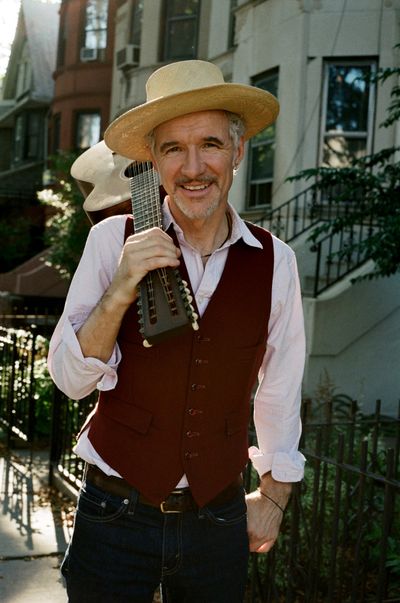Dan Zanes on why sensory-friendly shows are ‘the future of family entertainment’

WASHINGTON – When Dan Zanes won the Grammy for best musical album for children in 2007, it ratified the success of his second musical career. After fronting the rock band Del Fuegos in the 1980s, he reinvented himself as a children’s music artist and has become a major figure in the genre, with 16 albums and tours across North America, Australia, Spain and England. So when the John F. Kennedy Center for the Performing Arts was looking to commission a musical for all ages, Zanes was a natural choice.
“Night Train 57,” starring Zanes and his fiancee, Claudia Eliaza, has been promoted as a “sensory-friendly folk opera” in advance of its recent world premiere at the Kennedy Center. “Sensory-friendly” is the new buzz phrase in family entertainment, describing performances that are welcoming to audience members who struggle with autism, verbal expression, overstimulation or short attention spans.
Zanes did his first sensory-friendly show two years ago in Pennsylvania. “My show was exactly the same, but the venue had changed things out of consideration for different audiences,” he says. “The sound was kept at a more moderate level. The lights were kept up in the house more, because more people were getting up and moving around. Language was posted in the venue that all behavior was welcome, that all reactions were acceptable. Within five minutes, I realized this was the future of family entertainment.”
He did some research and discovered that the Kennedy Center was leading the way. The venue’s 2013 guidebook “Sensory-Friendly Programming for People With Social & Cognitive Disabilities” had become “the bible for this movement,” Zanes says. He and Eliaza were in Washington in December to work on an album, so they asked to come to the Kennedy Center to talk about the movement.
“It was such an incredible moment when we met with them,” Eliaza recalls. “After a long conversation about sensory-friendly performances, they said, ‘How would you like to create such a show?’ … We came up with this idea for ‘Night Train 57,’ a musical about a train that can fly through the galaxies. We would be the conductors that helped the audience get to where they wanted to go. Kids find trains fascinating, and it seemed a cool way to talk about leaving the super-familiar to go someplace unfamiliar.”
The railroad has long been part of Zanes’s music. He won the Grammy for his album “Catch That Train!,” and his new album, “Lead Belly, Baby!” boasts the immortal train song “Rock Island Line.” That tune was made famous by the folk and blues musician Lead Belly and was a hit for Johnny Cash and Lonnie Donegan, who kicked off the skiffle craze that inspired the Beatles. Zanes encountered the song as a 7-year-old in 1968, when he found Lead Belly staring out from an album cover at the local library.
“It was like he was looking right at me,” Zanes says. “I’d grown up in Concord, New Hampshire, and I’d never seen anyone like Lead Belly, nor had I heard anything like his voice with that 12-string guitar. What his music did for me was open my mind to a bigger world.”
Lead Belly, who died in 1949, has been a touchstone for Zanes ever since. After the Del Fuegos disbanded and a solo rock album flopped, Zanes found himself in Brooklyn, singing songs for his daughter and the other families that gathered at the local playground. He combined a rock ’n’ roll energy with the folk songs he had learned from Lead Belly and Pete Seeger. The parents’ enthusiasm convinced him he should record this new family music – or, as he prefers to call it, “age-desegregated music.”
“When my daughter was a couple years old,” he says, “I went looking for the updated version of Lead Belly, who was a master of playing for young people. … I had this sound in my head, but I couldn’t find it. When I went into a record store, everything was tied into a cartoon or a movie. So I decided to make that music myself. Rock ’n’ roll has always felt like folk music to me. I never made the distinction between Pete Seeger and Chuck Berry. I thought they were cousins, and not distant cousins at that.”
Zanes had long wanted to do a tribute to Lead Belly, but for the longest time he couldn’t find a way to capture his hero’s diversity and communitarian spirit. But in the Haitian neighborhood in Brooklyn where he lives, Zanes discovered the island’s classic 1950s kompa recordings in the local shops. In the layers of percussion and vocals, he says, is the sound of “many people working together to make something bigger than themselves. It was the pinnacle of social musicmaking.”
Social music also was the key concept for “Night Train 57,” Eliaza says. As a certified music therapist in New York, she knows that individuals react to music in different ways. So for this tale of an intergalactic train journey, she and Zanes wanted to create songs that could accommodate a variety of responses. “People are invited to sing along,” she says, “or if they’d rather move, the songs invite them to dance along.”
“Artists like Lead Belly, Seeger and Berry,” Zanes adds, “were trying to bring us together. Sensory-friendly programming does the same thing. If I look around a room and I see that somebody’s not there, I don’t want to be there either. I want to be at the party where everyone’s invited.”